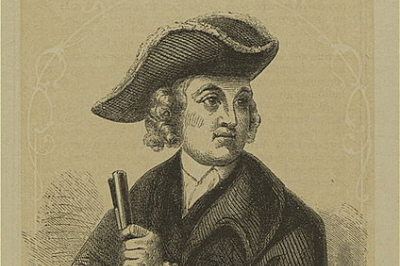
The Remarkable Deliverance of Benjamin Church
Several years ago, touring the colonial sites of New England, I was astonished by the story of Benjamin Church. Church, a colonist, fought native American forces during King Philip’s War, around 1675. The story was so remarkable that I recorded it in my journal at the time. Now I share it with you. It is chronicled in a colonial book titled An Entertaining History of King Philip’s War. As you will see, it is not only entertaining, but it also reveals that our lives are in God’s hands – we can rest content that we are ‘immortal, till our work on earth is done.’
The story is set near the beginning of the war; Captain Church was attempting to negotiate with any natives that he could find, trying to dissuade them from the fight. Near the shore of the Sakonnet River in modern-day Rhode Island, Church and his company of twenty men finally found two natives.
Church called to the natives, trying to persuade them to stay and talk, but they ran away, shooting back at him and his men. The colonists opened fire, but the natives disappeared into the woods.
Not one to give up quickly, Church and his men rushed into the thick forest, but suddenly they were confronted with an eruption of musket fire. Dozens of natives fired on the colonists in a surprise ambush.
Church turned, fully expecting to see the ground littered with the bodies of his troops. To his surprise, not a man had been struck. Assessing the situation, he ordered his men to retreat to the field. Not only would they be able to survey the battle more accurately, but the field lay near the river shore, and they would need some assistance in this fight.
As they took up new positions under a wooden fence near a field of cultivated peas, Church gazed intently at the forested hill. There were so many native muskets gleaming in the sun that the entire hill soon appeared to be glistening; even worse, Church observed that the natives were moving in a circular direction, obviously intending to cut off his retreat.
Again, the colonists retreated, this time to an old stone wall. The river was now directly behind them, and a wide field separated them from the native firepower. Yet as Church later recounted, the colonists “…were immediately…beset with multitudes of Indians, who possessed themselves of every rock, stump, tree, or fence that was in sight, firing upon them without ceasing…” Then, the natives took up positions in a stone house, situated on a small hill, which overlooked the colonial position. There was no way to avoid the gunfire pouring down from the stone house, except by hastily piling up stones, which Church’s men quickly began to do.
The battle raged for hours, which was a problem for the colonists, who were short on gunpowder. As the fight progressed, they signaled for help from their countrymen, who eventually sent a sloop – a type of one-masted sailing boat – to try to rescue them. Yet as the sloop approached the battlefield, the natives began to focus their weapons on the boat. The captain of the sloop hesitated; apparently, he wanted to help, but he realized the danger to his own vessel. Church’s men called out to him loudly, begging him to assist them, and shouting that their gunpowder was running out.
Obviously, Church did not want that information to be known by his enemies. He took matters into his own hands, commanding that the captain either send a small canoe to rescue them, or that he leave them to their fate. And the captain chose…the second option! As the sloop faded into the distance, Church’s men remained pinned down by enemy fire and heavily outnumbered.
After an agonizingly long time, another sloop gradually approached. Here was a captain who was willing to help the colonists, even if the native fire was soon shattering the wooden sides and shredding the sail of his boat. The sloop sent a small canoe to the shore, and Church’s men piled aboard – but only two could fit at a time. The canoe traveled back and forth, from the sloop to the shore, and from the shore to the sloop, and back again. It must have felt like an eternity.
At last, his men evacuated, Church prepared to embark on the canoe. Just as he was about to enter, however, he noticed that his sword and hat were lying a little distance away. Church ran back to get them, his men shouting at him not to do so, while the concentrated fire of every native was focused solely on the sprinting colonial commander. In this moment of desperate abandon, Church fired off a shot at the enemy, using his every last grain of gunpowder, but even that was insufficient; the musket ball could not reach even halfway toward his opponents.
Church returned with his possessions, diving into the canoe. A few moments later, a native musket-ball narrowly grazed his hair, and part of the wooden hull that Church leaned against splintered from the force of a second projectile. Yet Church was unscathed.
As Nathaniel Philbrick recounts in his book Mayflower, “It had been a remarkable day. For six hours, twenty men had held off three hundred Indians (a number that was later confirmed by the Indians themselves) without suffering a single casualty. It was a deliverance that Church looked to for the rest of his life as indisputable proof of ‘the glory of God and His protecting providence.’”



